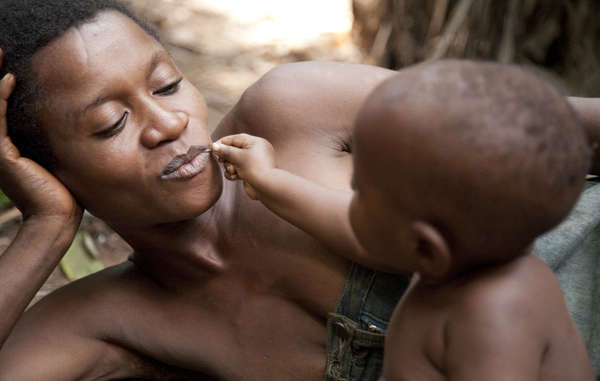
by Deep Green Resistance News Service | Mar 9, 2018 | Colonialism & Conquest
Featured image: The Baka are better at looking after their environment than anyone else. © Selcen Kucukustel/Atlas
by Survival International
Four Baka – two women and two men – were beaten up by eco-guards in the Republic of Congo last week. The Baka had just returned to their village, after spending the day in the forest, when a squad of eco-guards arrived and accused them of hunting elephants.
Survival has received reports that the two Baka men were arrested and are now in prison, even though the eco-guards found no evidence that they had been hunting.
A similar case of abuse was reported in a neighbouring community a week earlier, around 23 February: a group of Baka were coming out from the forest when eco-guards beat them up and arrested them.
Eco-guards are patrolling huge swathes of north-east Congo Republic, including regions which are not officially recognized as “protected” areas. They are funded and equipped by WWF and according to several sources, are spreading terror among Baka in the name of conservation.
A Baka man told Survival: “They always do that kind of abuse, especially to Baka. They need to beat people to show they are doing a good job.”
Eco-guards are also involved in other cases of abuse, harassment, torture and arrest of innocent Baka people. One case, in early 2017, was described as a “catastrophe.” The guards made Baka men, women and children strip to their waists, get to the ground and “crawl like snakes” while the guards kicked and whipped them with their belts.
Physical violence is just one part of the abuse that tribal people have to face in the name of conservation. Eco-guards regularly steal Baka food, burn their homes and destroy their tools.
“The eco-guards came here to abuse us for nothing. Every time it is beatings and whippings–and they break our radios, and pierce our cooking pots,” says one Baka man.
Today the Baka say they do not feel free to move around and live in their ancestral land. The climate of fear is so strong that they feel unable to hunt, fish and gather plants to feed their families, with serious consequences for the Baka’s health and well-being.
These abuses are not just illegal: they are harming conservation. Targeting tribal hunters diverts action away from tackling the true poachers–criminals conspiring with corrupt officials–and harms conservation.
Moreover, the big conservation organizations are partnering with industry and tourism and destroying the environment’s best allies. Like many tribal peoples, the Baka know better than anyone else how to take care of elephants and other wildlife in their forests.
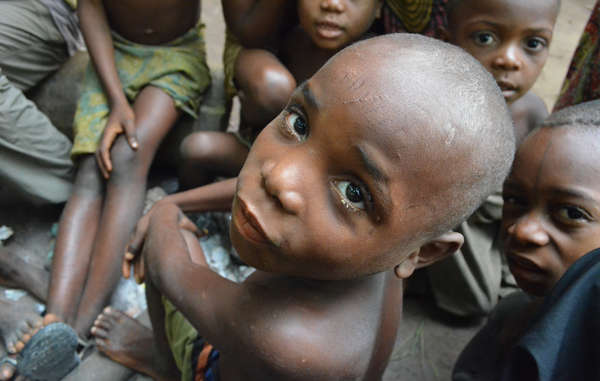
by Deep Green Resistance News Service | Jan 8, 2018 | Colonialism & Conquest
Featured image: A recent epidemic in the Republic of Congo is said to have been aggravated by the loss of indigenous peoples’ resources due to conservation and logging projects. © C. Fornellino Romero/Survival International
by Survival International
A Congolese organization has recently raised concerns that conservation contributed to the deaths of several dozen children, mostly Bayaka “Pygmies,” during an epidemic in 2016 in the Republic of Congo – the latest in a long line of related reports.
The deaths have been attributed by a medical expert to malaria, pneumonia and dysentery, aggravated by severe malnutrition.
Conservation-related malnutrition among Bayaka children in this region has been reported since 2005 at least, as the Bayaka are prevented from hunting and gathering on their lands by wildlife guards through violence and intimidation.
These guards are funded and equipped by the Wildlife Conservation Society (WCS), one of the world’s largest conservation organizations, and the logging company it has partnered with, CIB. Both organizations have failed to take effective action to prevent abuse.
“The wildlife guards abuse us. They don’t want us to go into the forest. How can we feed our children?” a Bayaka man from Mbandza, the site of the epidemic, told Survival in 2016.
These guards have been accused of abusing Bayaka and stealing their food for over 13 years. One such attack that took place in Mbandza in early 2016 left one man hospitalized.
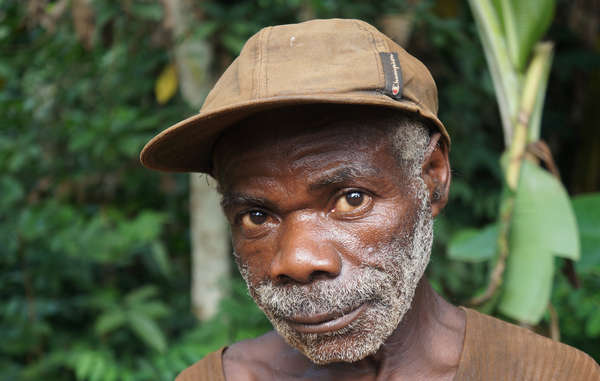
The Baka and Bayaka’s consent is required by law for any major project on their lands, but this is ignored by WWF and WCS. © Survival International
In this way, the Bayaka are being illegally evicted from their ancestral homelands by threat of violence. As one Bayaka woman explained: “If we go into the forest we eat well there compared to the village. We eat wild yams and honey. We want to go into the forest but they forbid us to. It frightens us. It frightens us.”
Critics have noted that the guards have also failed to protect the wildlife the Bayaka depend on for food, since they have difficulty tackling corruption and the creation of logging roads, the two main drivers of poaching.
Plummeting health has been reported among Bayaka living in the Dzanga-Sangha Protected Areas in the Central African Republic – one of the World Wildlife Fund’s (WWF) flagship projects – since 2006. Conditions encountered among older women “would be considered a public health crisis by international health agencies,” according to research published in 2016.
Increased malnutrition and mortality have been reported among Baka “Pygmies” in Cameroon, where WWF also operates, and among Batwa “Pygmies” in another of WCS’s project sites in east Democratic Republic of Congo.
“Now we are afraid of the anti-poaching squads. Before when a woman gave birth we took her to the forest to help her regain her strength and weight, now we can’t do this. We would take our children to the forest to avoid epidemics. Now we know illnesses we never knew before,” one Baka woman in Cameroon told Survival.
Watch Baka describe the abuse they face as a result of WWF’s conservation projects
Baka health plummets due to conservation
In the Congo Basin, the Baka, Bayaka and dozens of other rainforest peoples are being illegally evicted from their ancestral homelands in the name of conservation. Their health is plummeting as a result.
The big conservation organizations that support these conservation projects, like the World Wildlife Fund (WWF), refuse to abide by basic international standards and secure their consent.
Neither WCS nor WWF has attempted to secure the indigenous peoples’ consent, as basic due diligence and their own human rights policies require.
Survival’s Director Stephen Corry said: “Land theft is a serious and deadly crime, as these reports show. Many associate conservation with reason and compassion but, for Baka and Bayaka, it often means mindless violence and plummeting health. When will WWF and WCS finally start complying with their own human rights policies? ”
Timeline
1996: The organization Berggorilla & Regenwald Direkthilfe finds that malnutrition and mortality has increased among Batwa “Pygmies” since they were evicted from Kahuzi-Biega, a national park in east Democratic Republic of Congo (DRC) funded by WCS.
1997: WWF observes that the fact that the Bayaka are banned from hunting or gathering inside the Dzanga-Ndoki Park, the park in the Central African Republic (CAR) that WWF helped to create, “punishes [the Bayaka] severely” and is undermining their food security.
2000: A study finds that the Batwa in Kahuzi-Biega, DRC, are suffering from nutritional deficiencies, because they are no longer able to hunt in the forest, and soaring mortality rates. Malnutrition is particularly pronounced among women and children.
2004: A BBC investigation into CIB’s logging concessions in Congo hears from a Bayaka man: “We get so much suffering because of [wildlife] guards. We can’t go and find things in the forest as we used to. All we hear is hunger.”
2004: Bayaka from another community in Congo report to Greenpeace: “Then we met another white man (WCS) who came to tell us to stop hunting and that the wildlife guards would make sure we did. Now we are afraid to go far in the forest in case the wildlife guards catch us so we have to stay in the village. […] Now we are dying of hunger.”
2005: The Congolese Observatory on Human Rights, the organization that reported on the 2016 epidemic, documents three cases of violent abuse against Bayaka by wildlife guards, and warns that some Bayaka “are dying of hunger.”
2005: A news report recounts how Bayaka in one of CIB’s logging concessions describe being targeted by wildlife guards that mistreat and temporarily imprison them, and how this has led to more frequent malnutrition among children and vulnerable adults.
2006: WWF and its partners commission a report that finds that the Bayaka in Dzanga-Sangha, CAR, are struggling to feed themselves. The Bayaka interviewed for the report state that the conservation project has forced them out of some of their richest hunting and gathering grounds. They report that wildlife guards harass or attack them even when they try to use the reduced areas of land they have left, all the while accepting bribes from the real poachers who were emptying the forest of its wildlife. Some Bayaka women are finding it so hard to find food, the investigator hears, that they have been driven to sex work in the nearby town.
2006: An article in The Lancet cautions that “Pygmy peoples’ health risks are changing as the central African forests, which are the basis for their traditional social structure, culture, and hunter-gatherer economy, are being destroyed or expropriated by […] conservation projects:”
2008: UNICEF warns that the Bayaka’s right to gather resources is being “flouted on the most basic level because indigenous people no longer have access to areas rich in game” due to protected areas in Congo.
2012: An anthropologist with 18 years’ experience working with Bayaka in Congo reports increasingly poor nutrition and increased mortality. He attributes this to the removal of forest resources by loggers and to “conservationists’ exclusionary and draconian management practices.”
2013: A researcher at the University of Oxford reports that the combined impact of conservation and logging have led to poorer health and higher levels of drug and alcohol addiction among the Bayaka. He argues that conservation efforts would benefit from gaining people’s consent
2014: A medical study finds that “punitive anti-poaching measures” and dwindling wildlife have caused health to plummet among Bayaka in Dzanga-Sangha, CAR, particularly among women. “It is disheartening to see health decline so closely tied […] to the conservation management policies of the last twenty-five years,” the study’s authors note.
2015: A doctor with extensive experience working in CIB’s logging concessions reports that: “Aside from wounds inflicted by gorillas, buffalo or other wild animals, my colleague and I also see [gun] wounds in people claiming to have been attacked – sometimes without warning – by the protectors of wildlife: the wildlife guards.”
2015: The same doctor tells Survival: “I find this [wildlife guard violence] a very serious problem and in my opinion most wildlife guards have other motives than protecting the animals to work as a wildlife guard.”
2016: A second doctor with extensive experience working in CIB’s logging concessions describes to Survival the seasonal malnutrition she encounters among Bayaka, which she attributes to repressive conservation policies.
“Pygmy” is an umbrella term commonly used to refer to the hunter-gatherer peoples of the Congo Basin and elsewhere in Central Africa. The word is considered pejorative and avoided by some tribespeople, but used by others as a convenient and easily recognized way of describing themselves.
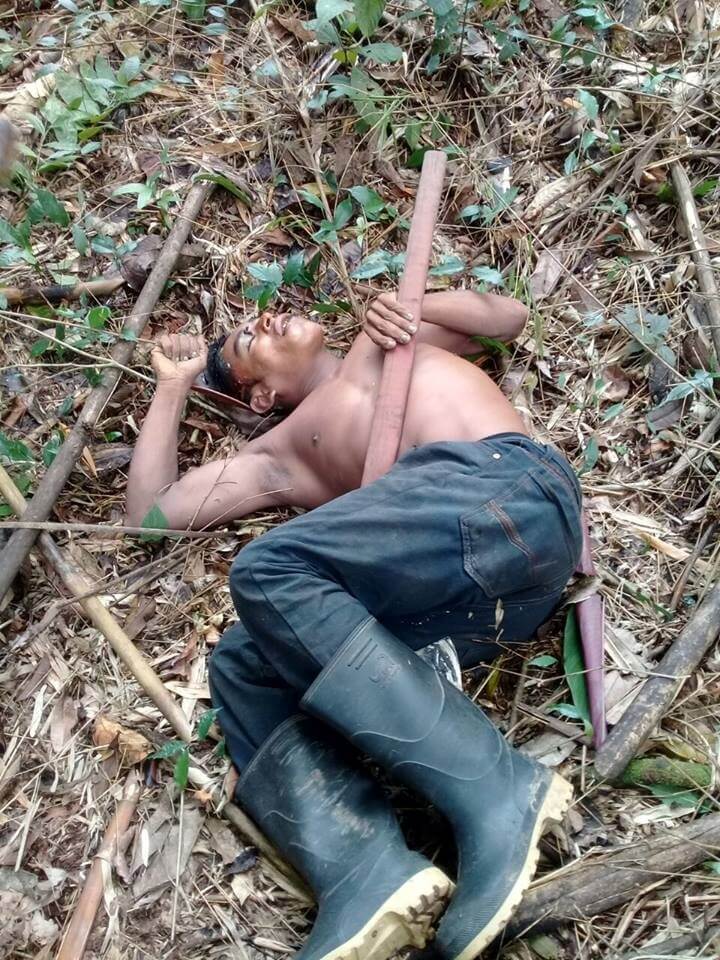
by Deep Green Resistance News Service | Dec 7, 2017 | Colonialism & Conquest
Featured image: Cejudhcan Derechos Humanos
by Courtney Parker / Intercontinental Cry
¡Ya Basta! A phrase known for its political and revolutionary connotations throughout much of the Spanish-speaking world, translates roughly into English as, ‘Enough is Enough!’
It is a statement of finality; a concrete call to action; a heightened call for awareness; and an official call of duty to end cultures of violence and impunity against Indigenous Peoples.
His name was Felipe Perez Gamboa. He was 24 years old.
According to Mark Rivas, who has aided in representing the Moskito Council of Elders at the United Nations, Gamboa was a leader of much distinction among the young people of the community of La Esperanza on the traditional Indigenous frontier region of Moskitia – located on the northern Caribbean coast of colonial Nicaragua and home to the largest tropical rainforest, second only to the Amazon, in the western world.
For his part, Rivas credited Cejudhcan Derechos Humanos – a local NGO whose founder, lawyer Lottie Cunningham, and staff, have been on the receiving end of death threats for their ongoing human rights work in the region – with originally disseminating and confirming the tragedy to the larger community.
The traditional Indigenous frontier regions of Moskitia have been terrorized by mounting acts of deadly colonial violence, stemming from the expanding agricultural frontier and the rigidly nationalist agenda, since 2015.
IC first began reporting on the escalating tragedies in the traditional Indigenous regions in June of 2016.
Readers may refer to previous analyses here and in other outlets concerning the role of the Ortega government, neoliberalism, and the fraudulent banner of ‘Christian Socialism’ the fallen Sandinista leader still attempts to hang over his tenuous authoritarian rule.
As of right now, we can do no more than reach out to the Indigenous rights community in the rest of Latin America, and across the world, with the simple message, made famous by the Zapatsista, that ‘Enough IS Enough’.
It’s time to end this culture of impunity surrounding deadly violence against Indigenous Peoples – in this instance, those who are protecting the last bastions of a biodiverse, climate mitigating rainforest.
¡Ya basta!
¡YA BASTA!
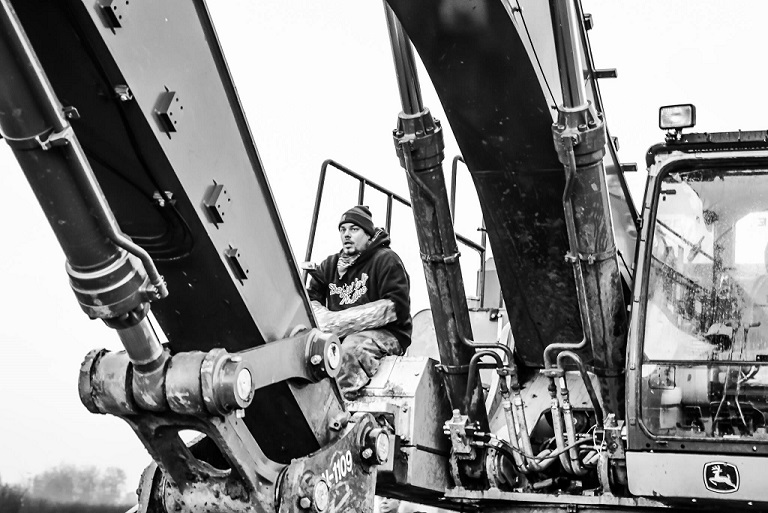
by Deep Green Resistance News Service | Nov 20, 2017 | Obstruction & Occupation
by Makwa Initiative Line 3 Front Line Resistance
Early Wednesday morning water protectors from Camp Makwa stormed an Enbridge construction site, and delayed progress on the last unfinished Wisconsin segment of their proposed line 3 pipeline project. One individual from the Diné Nation descended into the muddy trench, climbed onto the pipe, and locked himself to welding equipment. A Leech Lake Tribal member then climbed atop an excavator and attached himself to a hydraulic arm. Construction was halted for approximately six hours, costing the company thousands of dollars, as the individuals put their bodies on the line to protect the water and the futures of their children.
See the video here
Later in the day two more water protectors were arrested, while standing on the side of the public road. They were both tackled to the ground by Sergeant Kirchhoff of the Superior Police Department. For one of the arrests, when asked on what grounds he was acting, officer Kirchhoff cited a warrant that he could not produce. Later investigation found that the warrant he cited was unsigned and improperly filed. Last Week Sergeant Kirchhoff received media attention for tackling a woman to the ground without warning at a similar protest. The woman’s charges were later dropped.
The Enbridge Line 3 Replacement Project is estimated to carry almost one million barrels of tar sands oil from Alberta, Canada to Superior, Wisconsin; Enbridge has received approval in Wisconsin, but has not received approval in Minnesota, which would be the largest segment of the proposed project. The non-violent direct action came after a week of evidentiary hearings in Minnesota, where Enbridge revealed that it had already paid for 100% of the pipe for the project. The same day as the action it was discovered that before her time in public office Judge Ann C O’Reilly, the individual in charge of holding public hearings on the Line 3 Project, worked for a firm that represented oil companies on multiple occasions.
One water protector stated “Enbridge doesn’t have their permits for Minnesota and they have already started chopping trees down for their easement and filling its pipe storage yards. We went to the public hearings and found them full to the brim with Enbridge employees who were paid to be there. We fought again and again just to have 3 minutes to speak. Now we watch as truck after truck come into our communities carrying pipes and out of state pipeline workers. We made our comments, but they didn’t listen. The project is already bringing violence to our land and our women and children. We know that with these man camps comes increased levels of drugs, rape, and missing and murdered indigenous women. Enbridge will not take no for an answer so we have to stop them. We want to make clear in no uncertain terms, Enbridge is not welcome in Minnesota.”
Donate to Camp Makwa-
Camp Supplies: youcaring.com/makwacampsupplies
Legal Fund: youcaring.com/makwalegal
by Deep Green Resistance News Service | Sep 25, 2017 | Colonialism & Conquest
Featured image: World Wildlife Fund (WWF) has been working in the Congo Basin for decades – supporting squads who have committed violent abuse against tribal people. © WWF
by Survival International
A new Survival International report details widespread and systematic human rights abuses in the Congo Basin, by wildlife guards funded by the World Wildlife Fund (WWF) and other big conservation organizations.
The report documents serious instances of abuse between 1989 and the present day in Cameroon, the Republic of Congo, and the Central African Republic (CAR) by guards funded and equipped by WWF and the Wildlife Conservation Society (WCS), the parent organization of New York’s Bronx zoo.
It lists more than 200 instances of abuse since 1989, including pouring hot wax onto exposed skin, beating, and maiming with red-hot machetes. These incidents are likely just a tiny fraction of the full picture of systematic and ongoing violence, beatings, torture and even death.
As well as these especially cruel incidents, the report also documents the forms of harassment that have become part of everyday life for many people, including threats, and the destruction of food, tools and personal belongings.
Read the full report here.
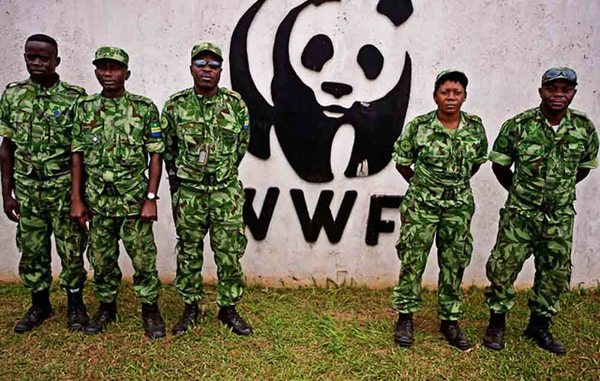
WWF funded guards in Gabon. © WWF
As well as Survival, over the past three decades, numerous independent experts and NGOs have raised concerns about these abuses. These have included NGOs like Greenpeace, Oxfam, UNICEF, Global Witness, Forest Peoples Programme, and research specialists from University College London, the University of Oxford, Durham University, and Kent University.
WWF and WCS have even partnered with several logging companies, despite evidence that their activities are unsustainable, and have not had the consent of tribal peoples as required by international law and their own stated policies.
One Bayaka man said: “A wildlife guard asked me to kneel down. I said: “Never, I could never do that.” He said: “If you don’t get down on your knees I’m going to beat you.”
A Baka woman said: “They took me to the middle of the road and tied my hands with rubber cord. They forced my hands behind my back and cut me with their machete.”
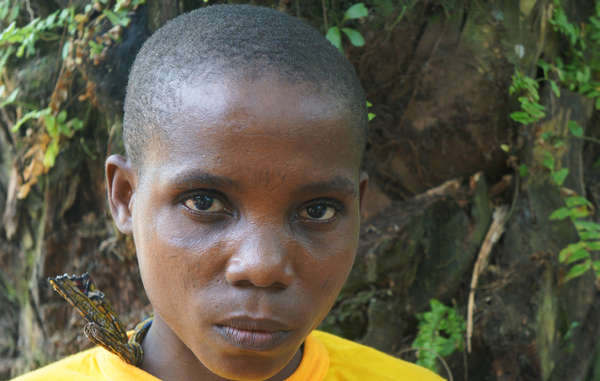
Survival has documented hundreds of instances of abuse, and collected testimonies from many “Pygmy” people. © Survival International
A Bayaka woman said: “They started kicking me all over my body… I had my baby with me. The child had just been born three days before.”
Tribal peoples have been dependent on and managed their environments for millennia. Their lands are not wilderness. Evidence proves that tribal peoples are better at looking after their environment than anyone else.
But big conservation organizations like WWF are partnering with industry and tourism and destroying the environment’s best allies. Now tribal people are accused of “poaching” because they hunt to feed their families. And they face arrest and beatings, torture and death, while big game trophy hunters are encouraged.
Survival’s Director Stephen Corry said: “This shocking report lays out, in detail, the abuse and persecution that “conservation” has brought the indigenous and tribal peoples of the Congo Basin. These are just the cases that have been documented, it’s impossible to imagine there aren’t a lot more which remain hidden.
“The big conservation organizations should admit that their activities in the region have been catastrophic, both for the environment and for the tribal peoples who guarded these forests for so long.
“WWF and WCS supporters might ask these organizations how they could have let this situation carry on for so long – and what they’re going to do now to make sure it stops.”
“Pygmy” is an umbrella term commonly used to refer to the hunter-gatherer peoples of the Congo Basin and elsewhere in Central Africa. The word is considered pejorative and avoided by some tribespeople, but used by others as a convenient and easily recognized way of describing themselves.







